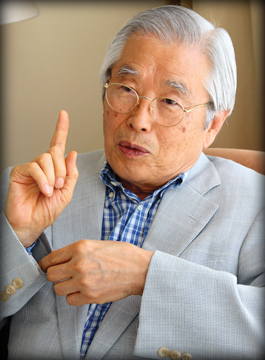|
The discovery of carbon nanotubes:
Iijima’s serendipity
by Dhaneshi Yatawara
Young scientists must find a world of their own beyond what they see
with the naked eye, says Professor Sumio Iijima from his hotel suit in
Colombo. Over the rumbling noise of Port City construction work, the
soft spoken discoverer of carbon nanotubes talks at length about
creating scientific inventors.
 “This is the advice I always give to budding scientists – to find
their own world of fascination. In this, knowledge and research
background always matters,” he says. “This is the advice I always give to budding scientists – to find
their own world of fascination. In this, knowledge and research
background always matters,” he says.
Discovered over 20 years ago, carbon nanotubes still fascinate the
science world. “My discovery is serendipity,” he says, explaining that a
thought cropped up in his mind he stepped on to this island nation,
which was once called as Serendib by Arabs.
Prof. Iijima is always asked by scientists and enthusiasts how he
discovered carbon nanotubes and as his usual answer is 'accidental'. “It
will always look like accidental but it is really not,” he explains.
“My long research carrier is what lead to the discovery. If I didn't
have the experience over material I would not have the knowledge to
understand the importance of nanotubes. So it is not just an accidental
discovery,” emphasizes Prof. Iijima.
Prof. Iijima, the Japanese Physicist who found the new material,
comes from a country where everything is taught in their mother tongue.
When questioned on the current changing patterns of this ideology he
says, “For a scientists to invent and discover, language should not
matter. Scientists speak in theories and principles. A scientists need
not be fluent in a common language like English but he or she should be
well versed in the subject. Discoveries comes with your knowledge and
experience. Language should not be a barrier. Concentrate on research
and development,” he says advising young inventors.
Reminiscing about his happy childhood, Prof. Iijima says he was a
curious child and is happy that the childhood curiosity never died. “I
was not a good student during my primary education.
I liked to see how things in the world work rather studying,” he says
in a lighter vein, adding, “But when I got to the higher education level
I was given a choice. Whether to go get a job or to study. I chose to
study. ”
Professor Iijima began his higher education with electronics in the
engineering faculty, but found it was unrelated to his passion. “It did
not hit me. I found physics more interesting and moved to that,” he
says.
Starting from universities Prof. Iijima worked his way through
government research institutes, before moving to the private sector in
the latter part of his carrier. “The point is, every time I moved I
found a new area to research and discovered or invented something,” he
says proudly.
Entering graduate school, young Iijima was fascinated with the
electron microscope and it became the technique in his research. By then
electron microscope was quite new to the world. “Every scientists must
find his or her own technique.
Everyone can be curious but a scientist need to develop a unique
technique to support his research area. In my case I became fascinated
with the electron microscope,” he says, elaborating that from butterfly
wings to strands of hair he inspected everything through his toy , the
electron microscope, which led t the discovery of the nano world. “I was
interested in crystalline and the electron microscope helped me to
observe these,” he adds.
This is why it is important for the universities and local
laboratories to make advanced scientific instruments available for
students, says Professor Iijima, emphasising, “That is what would
trigger an inventor mind.”
Prof. Iijima believes this could be an expensive task for a country
like Sri Lanka, but then says, as nothing is impossible, the scientific
community can work together with universities and other advanced
laboratories like the Sri Lanka Nanotechnology Institute (SLINTEC) and
let the students experience the high tech part of science.
“Young students willing to become inventors must get the exposure to
the changes happening in science in the world. And it should not be only
through the internet,” he say, claiming that the stimulation is needed.
“If students have no experience with an electron microscope how can they
practically know the nano world?” he asks.
Professor Iijima is of the belief scientists or students should not
be confined to a framed area.
“The focus of today's world is in interdisciplinary research and
development. Inevitably, science disciplines overlap. The boundaries are
more and more loosening up. Therefore it is important for scientists to
be broadminded if they are willing to create new things for the
betterment of the world,” he explains.
Is he happy about the development carbon nanotubes facing in the
scientific and the industrial world? Prof. Iijima believes there is
still a long way to go, but is confident that carbon nanotubes can be
used for more commercially viable products.
He sites the widely used smartphones as a good example and says
instead of glass like material, carbon nanotube can create a more
flexible material making the equipment more durable and efficient.
“Considering the tensile strength, cables made out of carbon nanotubes
are 10 times stronger than steel.
With a one millimeter diameter carbon nanotube you can hang a car
weighing one tonne,” he says, pointing out that its mechanical
properties are tremendous. “But all that have been tried are only at
research level and it needs to be tried at the industrial level too. So
there is a long way for the carbon nanotube to go,” he says
pragmatically. |

